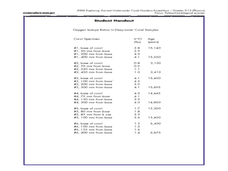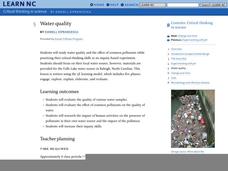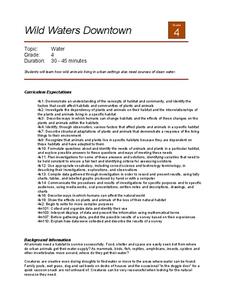Curated OER
Who Dirtied the Water?
Students develop a greater understanding and concern for the plight of our coastal waterways. Students begin to recognize that we are all partially responsible for water pollution.
NOAA
A Matter of Density
Larvae transportation on the New England seamounts is based on the density of the water. Scholars calculate density and graph salinity versus temperature to better understand the distribution of organisms in a water column....
Rainforest Alliance
How Do Jaguars and Howler Monkeys in Belize Depend on Us?
How does weather play a role in the lives of land and sea creatures? Find out with a instructional activity focused on habitats and the ways animals from different homes are connected. Here, learners explore how the life of a...
Alabama Wildlife Federation
Wildlife Habitat Checklist
Take a walk on the wild side with a project about animal habitats. After kids observe a chosen animal in its home, they describe the animal's food and water sources, shelter, and how it raises its young. They then write a short fictional...
Michigan State University
Create an Animal
Think beyond the animals and habitats we've already discovered and allow scholars to dream up their very own habitat and an animal that lives there. Class members present the new habitat and animal on a poster alongside an...
Michigan State University
In Search of Life
Explore the habitats around you with an activity that takes kids out of the classroom to learn about the local variety of habitats and the living things that call them home. In small groups, scholars investigate their surroundings,...
Rainforest Alliance
Protecting the Critical Habitat of the Manatee and Loggerhead Turtle
Explore ocean habitats with a instructional activity that showcases the home of manatees and loggerhead turtles in Belize. Here, pupils compare and contrast the homes of ocean animals to those of humans, listen to an original...
Umaine Museum of Art
Bony Fish Anatomy Worksheet
Take time to appreciate the beauty in the anatomy of animals with this cross-curricular art and science activity. After viewing examples of fish-themed artwork, children complete the included instructional activity by...
American Museum of Natural History
Ask a Scientist About Our Environment
Let's ask an expert! Scientists at the American Museum of Natural History field questions about the environment in an interactive resource. Question topics range from global warming and conservation to endangered species and habitats.
WolfQuest
The Return of Gray Wolves to Yellowstone National Park: Right or Wrong?
Should gray wolves be removed from Yellowstone National Park? After researching the complex relationships between the various habitats and species at Yellowstone National Park, including humans, class members take a position...
Curated OER
Oh Deer!"
Students explore the essential components of a habitat, which is food, water, and shelter. They end the lesson by paying the Oh Deer! game.
Wilderness Classroom
Ocean Life
Our oceans are composed of many complex relationships. Young oceanographers explore relationships between organisms, understand the world ocean's currents, and discover the effects of water pollution and how it behaves. There are...
Curated OER
Sand Shakes & Mud Pies: Investigating Sediment
Take a field trip to a location where water and land meet to study patterns of sediment organization in wet habitats: river or ocean beaches, sand dunes, tidal marshes, the edge of a pond, or a woodland stream. Small groups collect pairs...
Illinois Department of Natural Resources
Section Four: How Can We Protect Biodiversity?
Look into the future with a lesson plan on biodiversity and natural habitats. Learners read articles about different perspectives when it comes to planning future development, and decide which angle is the highest priority in a...
National Wildlife Federation
Habitat Web
Young scientists weave together an understanding of ecosystems with this fun collaborative activity. Taking on the roles of different living and non-living elements of specific habitats, learners use a ball of yarn to create...
NOAA
Deep-Sea Ecosystems – Life is Weird!
A pool of brine in the deep sea can be up to four times as salty as the surrounding sea water. The deep sea ecosystem relies on chemosynthesis and the organisms that live there are often strange to us. The lesson focuses on researching...
Curated OER
Dirty Mud
Students examine geological information to study benthic marine habitats. For this watershed project, students examine wetland habitats and land uses in a watershed. They will use geological information to discuss the impact of pollution...
Curated OER
How can deep-water corals be used to determine long-term patterns of climate change?
Students explore the concept of paleoclimatological proxies. In this paleoclimatological proxies lesson, students explain isotope ratios in deep water coral samples. Students write a paragraph about global climate change as...
Curated OER
Pollinator Habitats
Students read and discuss background information included with this lesson. They brainstorm the best sources for developing a list of native or migratory pollinators. Students work in groups to design habitats based on information...
Curated OER
Water Quality
Students investigate the properties of oil and water by making marbleized paper. They examine fish species by making Japanese fish prints and 3-D cardboard fish. They create posters that present messages about conserving our waterways.
Curated OER
Regents High School Examination: Living Environment 2005
The 2005 version of the Regents High School Examination in the area of ecology is as comprehensive as previous years' exams. It consists of 40 multiple choice questions on everything from the structure of DNA to the interactions within...
Curated OER
Regents High School Examination: Living Environment 2003
The living environment, from the interior of a cell to the complex relationships among populations, are queried in this final examination. Learners look at air pollution maps, diagrams of cells, population graphs, and drawing of cells....
Curated OER
Water Pollution, Stream Ecosystems
Students participate in a series of simulated activities designed to demonstrate the interconnectedness between the environment and the organisms that live there. They explore how polluting one element of an environment affects the...
Curated OER
Wild Waters Downtown
Fourth graders investigate how wild animals living in urba settings also need sources of clean water. They discuss the open water issues of West Nile Virus and what happens to urba animals as these poolings area are cleaned up. ...
Other popular searches
- Animals Water Habitats
- Animal Water Habitats
- Land or Water Habitats
- Shallow Water Habitats
- Water Habitats Lesson Plans
- Describe Water Habitats
- Water Habitats Rivers

























